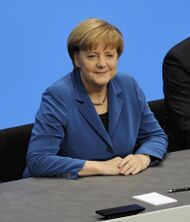Religious affiliations of Chancellors of Germany
Topic: Religion
 From HandWiki - Reading time: 3 min
From HandWiki - Reading time: 3 min

Most German Chancellors were followers of a Christian church. German society has been affected by a Catholic-Protestant divide since the Protestant Reformation, and the same effect is visible in this list of German Chancellors. It is largely dominated by Roman Catholics and Lutherans as these remain the main confessions in the country. One chancellor, namely Philipp Scheidemann, was Reformed (Calvinist).[1] Although there were some religiously sceptic chancellors, most never officially renounced their faith and were given a Christian funeral. Hermann Müller, a Social Democrat heavily influenced by his father-an advocate of Ludwig Feuerbach's views, is the only one notable for not having been a member of any confession at all. Friedrich Ebert was baptised a Roman Catholic, but later officially left the denomination[2]. Gustav Bauer is on record as unaffiliated to any recognised religion at least from 1912 to 1924 (thus including his term of office)[3], but he was buried on a Protestant cemetery[4]. A significant portion of Protestant chancellors belonged to the Prussian Union of churches, which united the Reformed and Lutheran confessions throughout the Kingdom of Prussia, and was in force since 1817. Some Roman Catholic chancellors came from the Catholic Centre Party. The Christian Democratic Union, a party of both Roman Catholics and Protestants, produced both kinds of chancellors.
As some chancellors' views are uncertain or causing confusion among researchers, such as these of Adolf Hitler or Joseph Goebbels, the official religion they were brought up in is only mentioned with a further information on their worldviews, if available. For issues pertaining to Nazi stance on religion, see Religion in Nazi Germany, Religious aspects of Nazism, and Adolf Hitler's religious views.
The current German Chancellor, Angela Merkel, is a Lutheran Protestant within the Evangelical Church.
By term
North German Confederation
| Name | Term | Religious affiliation | |
|---|---|---|---|
| 1 | Otto von Bismarck | 1867–1871 | Lutheran |
Germany
| Name | Term | Religious affiliation | |
|---|---|---|---|
| 1 | Otto von Bismarck | 1871–1890 | Lutheran |
| 2 | Leo von Caprivi | 1890–1894 | Lutheran |
| 3 | Chlodwig zu Hohenlohe-Schillingsfürst | 1894–1900 | Roman Catholic |
| 4 | Bernhard von Bülow | 1900–1909 | Lutheran |
| 5 | Theobald von Bethmann-Hollweg | 1909–1917 | Lutheran |
| 6 | Georg Michaelis | 1917 | Lutheran |
| 7 | Georg von Hertling | 1917–1918 | Roman Catholic |
| 8 | Max von Baden | 1918 | Lutheran |
| 9 | Friedrich Ebert | 1918–1919 | Irreligious (but see introduction above) |
| 10 | Philipp Scheidemann | 1919 | Reformed |
| 11 | Gustav Bauer | 1919–1920 | Irreligious (but see introduction above) |
| 12 | Hermann Müller | 1920 | Irreligious |
| 13 | Constantin Fehrenbach | 1920-1921 | Roman Catholic |
| 14 | Joseph Wirth | 1921–1922 | Roman Catholic |
| 15 | Wilhelm Cuno | 1922–1923 | Roman Catholic |
| 16 | Gustav Stresemann | 1923 | Lutheran |
| 17 | Wilhelm Marx | 1923–1925 | Roman Catholic |
| 18 | Hans Luther | 1925–1926 | Lutheran |
| 19 | Wilhelm Marx | 1926–1928 | Roman Catholic |
| 20 | Hermann Müller | 1928-1930 | Irreligious |
| 21 | Heinrich Brüning | 1930-1932 | Roman Catholic |
| 22 | Franz von Papen | 1932 | Roman Catholic |
| 23 | Kurt von Schleicher | 1932–1933 | Lutheran |
| 24 | Adolf Hitler | 1933–1945 | initially Roman Catholic, see details |
| 25 | Joseph Goebbels | 1945 | initially Roman Catholic |
| 26 | Lutz Graf Schwerin von Krosigk | 1945 | Lutheran |
| N/A | Vacant | 1945-1949 | N/A |
| 27 | Konrad Adenauer | 1949–1963 | Roman Catholic |
| 28 | Ludwig Erhard | 1963–1966 | Lutheran |
| 29 | Kurt Georg Kiesinger | 1966–1969 | Roman Catholic |
| 30 | Willy Brandt | 1969–1974 | Lutheran |
| N/A | Walter Scheel | 1974, acting | Lutheran |
| 31 | Helmut Schmidt | 1974–1982 | Lutheran |
| 32 | Helmut Kohl | 1982–1998 | Roman Catholic |
| 33 | Gerhard Schröder | 1998-2005 | Lutheran |
| 34 | Angela Merkel | 2005–present | Lutheran |
Affiliation totals
| Affiliation | |
|---|---|
| Lutheran | 16 |
| Roman Catholic | 12 |
| initially Roman Catholic | 2 |
| Reformed | 1 |
| Irreligious | 3 |
See also
- List of Prime Ministers of Canada by religious affiliation
- Religious affiliations of Prime Ministers of the Netherlands
- Religious affiliations of Presidents of the United States
References
- ↑ Scheidemann, Philipp Heinrich
- ↑ Federal Archives, files of the Reich chancellery, Friedrich Ebert's death
- ↑ See parliamentary handbooks downloadable here
- ↑ See "Gemeinde Glienicke/Nordbahn: Schon fast in Vergessenheit geraten"
 KSF
KSF